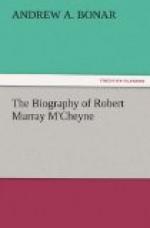“Aug. 14.—Partial fast, and seeking God’s face by prayer. This day thirty years, my late dear brother was born. Oh for more love, and then will come more peace!” That same evening he wrote the hymn, “The Barren Fig-tree.”
“Oct. 17.—Private meditation exchanged for conversation. Here is the root of the evil,—forsake God, and He forsakes us.”
Some evening this month he had been reading Baxter’s Call to the Unconverted. Deeply impressed with the affectionate and awfully solemn urgency of the man of God, he wrote—
Though Baxter’s
lips have long in silence hung,
And death long
hush’d that sinner-wakening tongue,
Yet still, though
dead, he speaks aloud to all,
And from the grave
still issues forth his “Call:”
Like some loud
angel-voice from Zion hill,
The mighty echo
rolls and rumbles still.
Oh grant that
we, when sleeping in the dust,
May thus speak
forth the wisdom of the just!
Mr. M’Cheyne was peculiarly subject to attacks of fever, and by one of these was he laid down on a sick-bed on November 15th. However, this attack was of short duration. On the 21st he writes: “Bless the Lord, O my soul, and forget not all his benefits. Learned more and more of the value of Jehovah Tzidkenu.” He had, three days before, written his well-known hymn, “I once was a stranger,” etc., entitled Jehovah Tzidkenu, the Watchword of the Reformers. It was the fruit of a slight illness which had tried his soul, by setting it more immediately in view of the judgment-seat of Christ; and the hymn which he so sweetly sung reveals the sure and solid confidence of his soul. In reference to that same illness, he seems to have penned the following lines. November 24th:—
He tenderly binds
up the broken in heart,
The
soul bowed down He will raise:
For mourning,
the ointment of joy will impart:
For
heaviness, garments of praise.
Ah, come, then,
and sing to the praise of our God,
Who
giveth and taketh away;
Who first by his
kindness, and then by his rod,
Would
teach us, poor sinners, to pray.
For in the assembly
of Jesus’ first-born,
Who
anthems of gratitude raise,
Each heart has
by great tribulation been torn,
Each
voice turned from wailing to praise.
“Nov. 9.—Heard of Edward Irving’s death. I look back upon him with awe, as on the saints and martyrs of old. A holy man in spite of all his delusions and errors. He is now with his God and Saviour, whom he wronged so much, yet, I am persuaded, loved so sincerely. How should we lean for wisdom, not on ourselves, but on the God of all grace!”
“Nov. 21.—If nothing else will do to sever me from my sins, Lord send me such sore and trying calamities as shall awake me from earthly slumbers. It must always be best to be alive to Thee, whatever be the quickening instrument. I tremble as I write, for oh! on every hand do I see too likely occasions for sore afflictions.”




